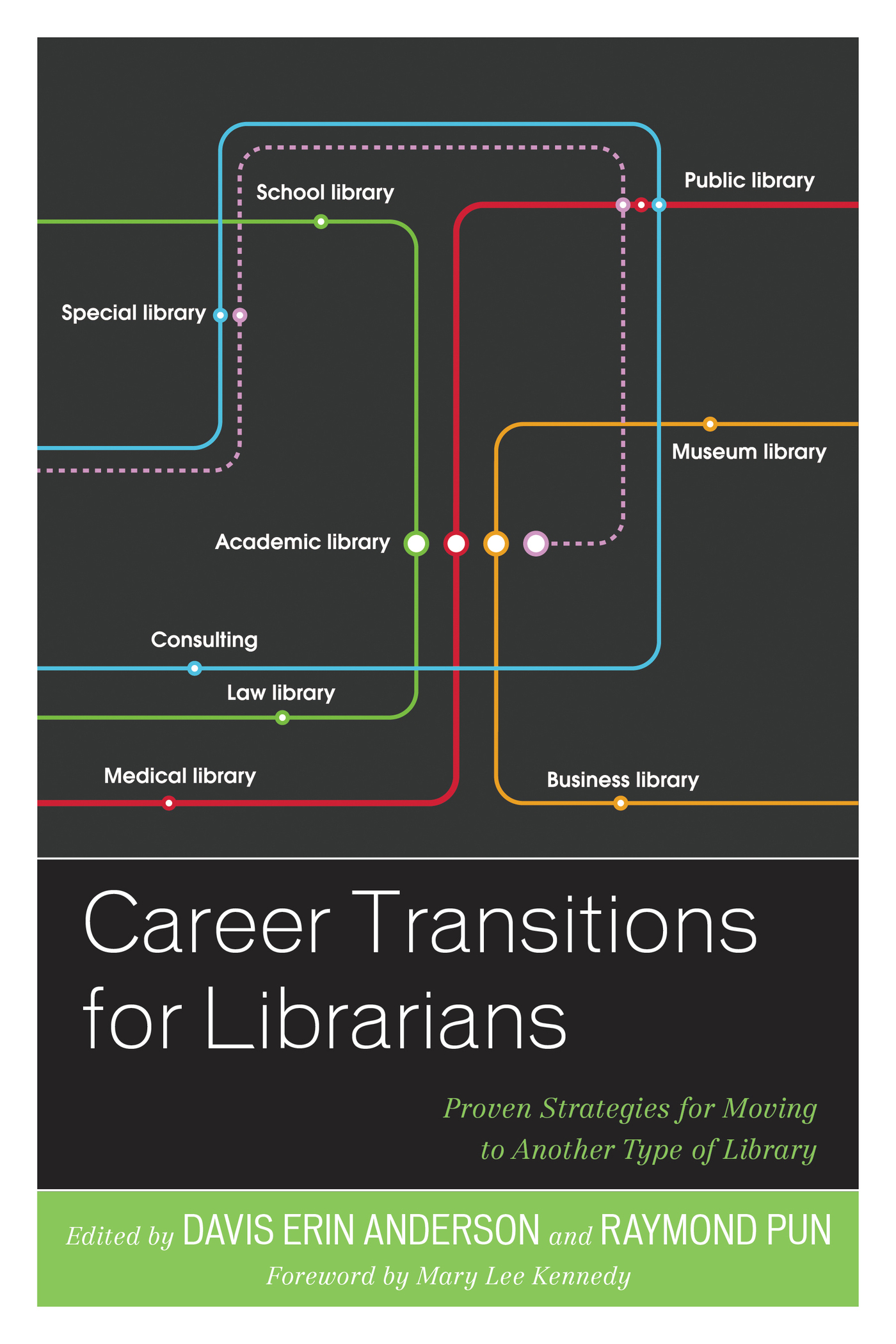Career Transitions for Librarians
Career Transitions for Librarians
Proven Strategies for Moving to Another Type of Library
Edited by
Davis Erin Anderson
Raymond Pun
ROWMAN & LITTLEFIELD
Lanham Boulder New York London
Published by Rowman & Littlefield
A wholly owned subsidiary of The Rowman & Littlefield Publishing Group, Inc.
4501 Forbes Boulevard, Suite 200, Lanham, Maryland 20706
www.rowman.com
Unit A, Whitacre Mews, 26-34 Stannary Street, London SE11 4AB
Copyright 2016 by Rowman & Littlefield
All rights reserved. No part of this book may be reproduced in any form or by any electronic or mechanical means, including information storage and retrieval systems, without written permission from the publisher, except by a reviewer who may quote passages in a review.
British Library Cataloguing in Publication Information Available
Library of Congress Cataloging-in-Publication Data
Names: Anderson, Davis Erin, 1981- editor. | Pun, Raymond, 1985- editor.
Title: Career transitions for librarians : proven strategies for moving to another type of library / edited by Davis Erin Anderson and Raymond Pun.
Description: Lanham : Rowman & Littlefield, [2016] | Includes bibliographical references and index.
Identifiers: LCCN 2016001659 (print) | LCCN 2016016513 (ebook) | ISBN 9781442265578 (cloth : alk. paper) | ISBN 9781442263727 (pbk. : alk. paper) | ISBN 9781442263734 (electronic)
Subjects: LCSH: Library scienceVocational guidanceUnited States. | LibrariansEmploymentUnited States. | LibrariansUnited StatesInterviews. | Career changesUnited StatesCase studies.
Classification: LCC Z682.35.V62 C36 2016 (print) | LCC Z682.35.V62 (ebook) | DDC 020.23dc23 LC record available at https://lccn.loc.gov/2016001659
 TM The paper used in this publication meets the minimum requirements of American National Standard for Information Sciences Permanence of Paper for Printed Library Materials, ANSI/NISO Z39.48-1992.
TM The paper used in this publication meets the minimum requirements of American National Standard for Information Sciences Permanence of Paper for Printed Library Materials, ANSI/NISO Z39.48-1992.
Printed in the United States of America
Foreword
Mary Lee Kennedy
Endless Opportunities to Empower People
through Information
When looking at career choices, there are endless opportunities for information to unlock the potential in human beings. Whether you are considering librarians, information scientists, content managers, information specialists, data scientiststhese roles are and will be critical today and in the future. All of these roles empower people through information.
Ive had the privilege of working in many parts of the world and in a variety of institutions. Throughout my career, the most exciting challenge has beenand remainsempowering people through information. By this I mean understanding the institutional and individual needs within a highly dynamic ecosystem and then diagnosing, designing, delivering, and continually iterating in order to bring the most valuable information to light, all in an effort to serve the creation of knowledge.
Peoples lives improve when they have access to information, are able to make sense of it, use it to create new knowledge, and share their knowledge with others. We all need access to quality information in order to survive and thrive at each and every stage of life. Whole societies depend on human beings ability to learn, create, innovate, and express themselves. But, alas, our society does not currently offer a level playing field; there remains much to do. Every individuals empowerment depends on a broad commitment to policies and practices that increase information access and fluency. Societal advancement depends on each of us choosing how and where we can make a difference.
In every position I have held, adding value depended on much more than applying my knowledge about information and information use. The institutional context had to become my context before I could figure out my initial step. That meant building strong relationships with decision makers and users, understanding political and economic realities, and being able to develop a shared understanding of success. In every instance, success depended on developing shared priorities (including the commitment of resources), a common language, and an agreed-on set of expectations.
Trust and progress depend on consistent communication, agreement on recalibrations as needed, and delivery of the final result. As a leader, delivery meant continually supporting others and committing myself to learning, letting go of what didnt work, reflecting, and determining subsequent action. No matter where you are, creating a visible difference is a must in this day and agehow it is done is as important as what is done.
The ability to do your best work will depend on whether or not you share the institutions values and how well you are able to work within its organizational culture. When considering a move to another institution, it is critical to review the values and culture of your new position first. This, of course, requires clarity about your own values. If necessary, take a few days (yes, days) to make a list of all your values and narrow it down to the top threethe three you cannot live without. This will serve you well. Assess these three values along the full cultural horizon: geopolitical fit, fit within a broader institution, fit within a workgroup, fit with your bossin that order. You will live in a geographical region every day beyond the workweek, you will go to work every day at an institution with its own reputation and rhythm, you will work with your team, and you will have a bossthese last two can and often do change, the others less so.
Aside from geopolitical values, organizational culture (defined here as how decisions are made, the nature and tone of language, how money is invested, and the types of reward and recognition systems) is the most important consideration. It is the essence of how an organization works, what it privileges, and how it supports its people in delivering on expectations. Some institutions are hierarchical and use formal language, whereas others are mission driven and make decisions through consensus. Some reward teams and others privilege individuals. Some recognize value in every functional unit, while others privilege specific job families. Some believe in large financial rewards for top performers, while others spend money only on core operations. Your ability to empower people through information will depend on your ability to work well within the organizational culture. Culture trumps all.
Once the culture fit is clear, you can assess the types of knowledge creation that do and can benefit from your professional suite of skills. You will always be expected to add value and make a difference.
Being excited and realistic about what you can contribute is essential. If youve identified a gap, youve identified an opportunity. What seems obvious about the variety of institutional approaches to information and its use should be examined, as what that means in everyday practice is usually quite complex. We all know that real-time information needs are very different than archival-research needs; college collections are very different than think tank collections; corporations investments in market research are very different than nonprofit investments; public libraries focused on neighborhood communities invest in information very differently than public research libraries; and humanists approach and use very different types of information than physicists or trading floors.
Next page
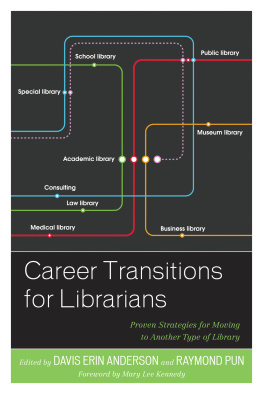
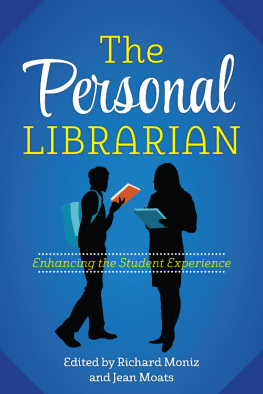

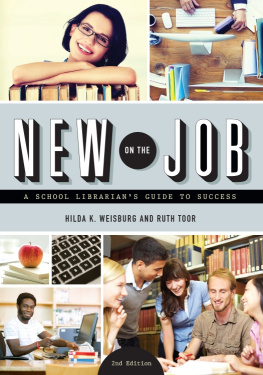
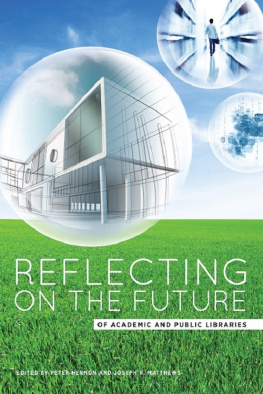
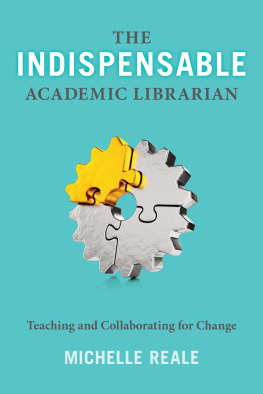
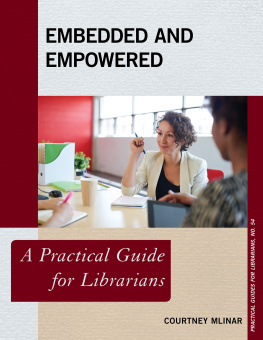
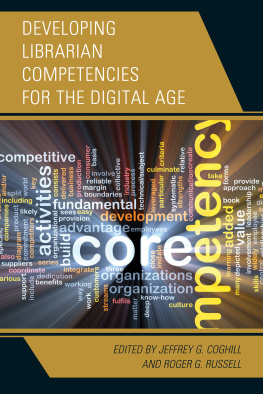
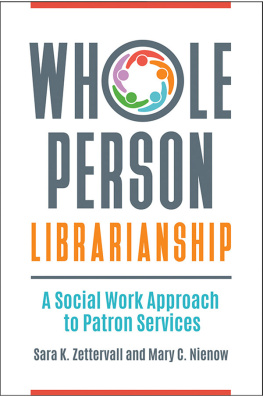

 TM The paper used in this publication meets the minimum requirements of American National Standard for Information Sciences Permanence of Paper for Printed Library Materials, ANSI/NISO Z39.48-1992.
TM The paper used in this publication meets the minimum requirements of American National Standard for Information Sciences Permanence of Paper for Printed Library Materials, ANSI/NISO Z39.48-1992.